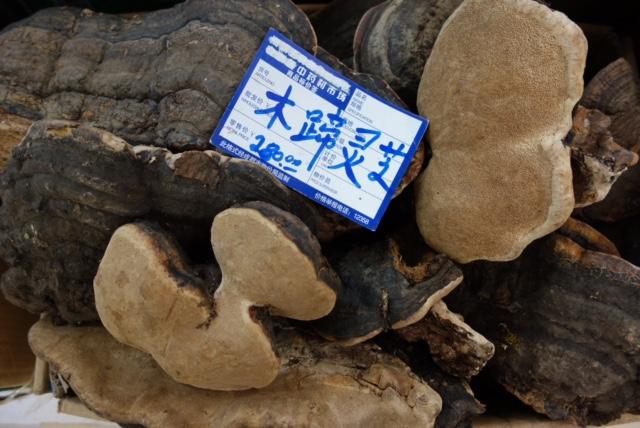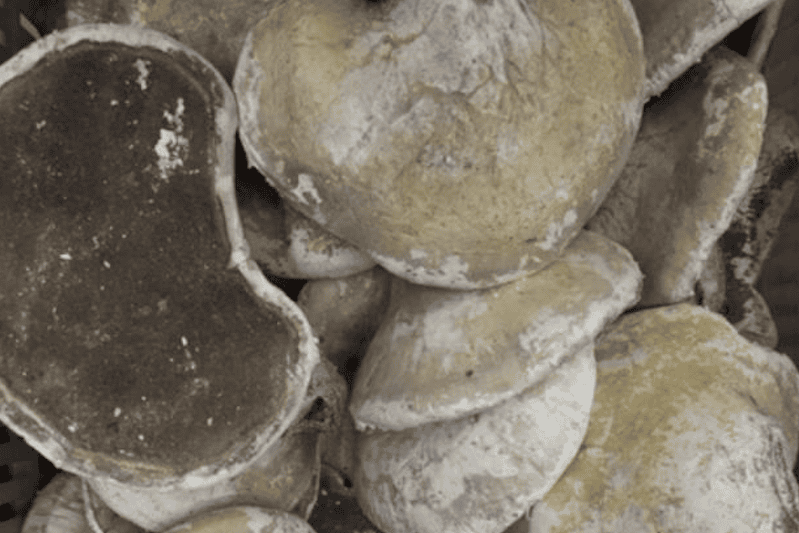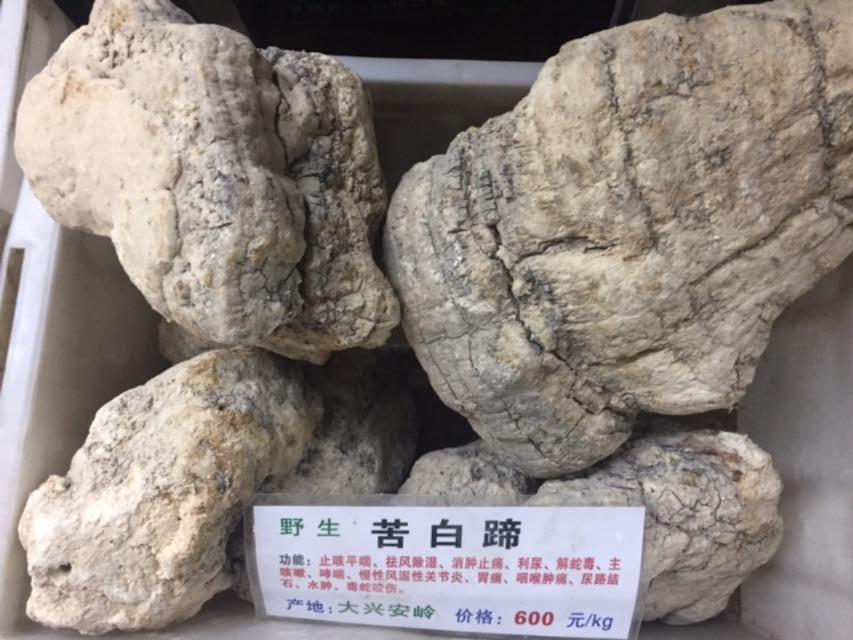Medicinal Polypores at the
Chengdu Medicine Market
Adam, 2016–2018The Polypores are a class of fungii without gills. They release spores through there ‘many holes’ (thus ‘poly’ + ‘pore’). Many of the medicinally important Polypores grow on either living or decaying wood. Most are hard and woody, being composed of lignans leached of the trees or wood they are growing on.
In general, the polypores are a non-toxic group, and contain good levels of polysaccharides. The Hapalopilus genus is one Polypore that has been associated with poisoning, and there may be others. But these tend to be spongy, not hard and woody. The medicinal polypores pictured below are all of a hard and woody type, and all these appear to have medicinal application due in part to their polysaccharide content.
The pharmacologically important polysaccharides are complex sugars that are found in many important tonic herbs. Various beta-glucan polysaccharides in the polypores have shown immuno-modulatory, anti-tumor, and anti-cancer activity. Some Polysaccharides have demonstrated various other beneficial effects related to healing, endurance and stamina improvement and other effects. Other studies have shown useful prebiotic effects from mushroom polysaccharides too. All these point to useful tonic effects that support traditional uses of these useful medicines.
However, the ability of polysaccharides to kill cancer cells (via apoptosis) varies greatly according to their composition and configuration. Therefore, not all polysaccharides have equal efficacy against tumors and cancers, and some types of polypores have been more especially associated with tumor and cancer treatment traditionally.
Two of the most important Polypores are the Ling Zhi (Ganoderma) used in TCM and the ‘White Agaric’ (Fomitopsis) of the Western Tradition. There are a number of varieties of Ganoderma, being typically brown and woody bracket fungi growing on wood. As a family, most if not all appear to have similar effects being especially useful as immunomodulators, and for anti-tumor and anti-cancer effects. The Chinese G. lucidum (Ling Zhi or Reishi) has been particularly thoroughly studied, a lot of this research being applicable to closely related members.
From the Chinese viewpoint these medicines, as well as various other different but related types of wood-growing fungii such as Poria Fu Ling, all have Damp-resolving properties. This makes them useful in various chronic diseases associated with Damp which includes Arthritic and Rheumatic diseases as well as Tumors and Cancers. They tend to have secondary tonic effects which support ‘Qi’ and increase immunity.
The White Agaric of the west is a special medicine to clear Phlegm, Damp and Melancholy. It is unique in having at first a sweet, then bitter taste. It dries damp and has a special effect of purging the Melancholy humor, thereby having been used for Fibroid Tumors and Cancers from ancient times. Melancholy has long been associated as the cause of Fibroid Tumors and Cancers in the western tradition. Research has likewise shown this to have anti-tumor and anti-cancer polysaccharides which have demonstrated efficacy against against various cancer cell lines. It also contains other unique qualities due to its bitter principle.
Below is a review of some of the major medicinal Polypores commonly available on the Chinese Medicine Market (Chengdu He Hua Shi Chinese Herbal Medicine Market, 2016–2018). Although there are many medicinal mushrooms varieties on the market, the following represent some of the most common.

|

|

|
Ganoderma resinaceum Wu Bing Chi Zhi 无柄赤芝 Neutral, Sweet, slightly Bitter 1. Nourishes Lungs and Kidney: -nourishes Qi, Yin and Essence 2. Benefits Spleen Qi, Harmonises Stomach: -modulates Immunity 3. Calms the Mind, Soothes the Nerves: -Neurasthenia 4. Clears Heat and Inflammation, Resists Toxin: -various Cancers, Leukemia -Heart disease, Cerebral hemorrhage, |

|
Ganoderma formosissimum Mu Ti Ling Zhi 木蹄灵芝 Neutral. Bitter 1. Move the Blood, Clears Stasis, Resolves Masses: -Gastric and Esophageal Cancer 2. Nourish the Heart, Calm the Spirit: -Insomnia, Neurasthenia 3. Strengthens Qi: -increases Immunity; good for weakness and fatigue -reduces side effects of Chemotherapy Dose: 10–20 grams per day in decoction |


|
Piptoporus Betulinus (syn. Fomitopsis betulina) Birch Polypore Bai Ling Zhi 白灵芝 White Ling Zhi, similar to the White Agaric of the West, is especially used for Phlegm and Damp diseases. 1. Clears Phlegm and Damp: -Cough, Asthma, Bronchitis -Rheumatism 2. Clears Heat and Toxin: -Antibacterial and Anti-viral effect -acute and chronic Hepatitis 3. Clears Phlegm, Resolves Masses: -Anti-tumor, Anti-Cancer; Cancers of Liver, Esophagus, Pancreas, Gastric, Breast, Lung, Nasopharyngeal cancer 4. Benefits Qi: -increases energy, improves Immunity 5. Nourish Heart, Calms the Spirit: -Insomnia, Neurasthenia –Cardiovascular and cerebrovascular diseases, hyperlipidemia, arteriosclerosis, Dose: 15–20 grams in decoction; 2–4 grams in powder. |

|
Trametes versicolor Yun Zhi 云芝 Cool, dry. Sweet. 1. Clears Liver Heat and Toxin: -Hepatitis -strengthens Liver, improves Eyesight 2. Immunomodulatory |

|
Phellinus pini Song Zhen Ceng Kong Jun 松针层孔菌 1. Anti-Cancer -Breast, Uterine Cancer; -increases appetite and weight, reduces pain, improves survival -enhances immunity, inhibits Metastasis -increases Tumor Necrosis Factor, reduces transaminase. -enhances efficacy of Chemo- and Radio-therapy, reduces side effects of the same |

|
Inonotus obliguus Hua He Kong Jun 桦褐孔菌 1. Improves Immunity, Anti-tumor, inhibits Metastasis, enhances efficacy of chemotheraputic drugs. 2. Benefits Heart, lowers Hypertension, improves Heart function 3. Clears Radiation via urine, reduces radioactive deposit into bone, promotes bone marrow to replenish WBC. 4. Hypoglycemia 5. Anti-inflammatory, Anti-bacterial, Anti-viral 6. Benefits digestion, enhances intestinal flora. |

|
Fomitopsis officinalis Ku Bai Ti 苦白蹄 ‘Agaric’ of the West This is the White Agaric of the Western Tradition. 1. Clears Phlegm and Damp: -important medicine for Phlegm Cough Chronic Bronchitis, Asthma -diseases caused by Damp and Melancholy inc. Edema, Stones, Rheumatoid arthritis 2. Cancer: -An important medicine for Tumors and Cancers. 3. Night sweats, Tuberculosis 4. Benefits Stomach: -stomach pain, diarrhea Dose: 3–6 grams in decoction See our Monograph on Agaricus |
See also
Fungii Materia Medica
Primary Uses of Medicinal Fungi
Medicinal Fungi in Cancer Therapy
References and further reading:
1. Apoptotic properties of polysaccharide isolated from fruiting bodies of medicinal mushroom Fomes fomentarius in human lung carcinoma cell line
2. Recent developments in mushrooms as anti-cancer therapeutics: a review
3. The Pharmacological Potential of Mushrooms
4. Medicinal mushroom: boon for therapeutic applications
